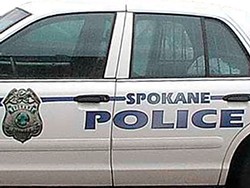MAYOR OF THE MIDNIGHT CITY
Mayor Mary Verner, in blue jeans and a dark wool
coat, walked softly into the basement of St. Matthew’s
Lutheran Church on a recent Saturday morning, where
Spokane’s black pastors had gathered for a regular business
meeting.
She had spent Friday night getting a different view of the city — her city — than she gets from the seventh floor of City Hall. She rode the night in a police cruiser. And not for the first time, she says.
“We have a lot of broken families,” Verner says.
“There is one call that’s haunted me. I haven’t had any
sleep all night.”
The call was first broadcast as a crowd of children —
dressed in black — dancing in the middle of Maple near
Mission. Further details come. They’re not dancing.
They’re fighting. The cruiser speeds across town.
“There was a clump of young people… all excited.
They want to tell the police officers how they were
attacked by West Side,” the mayor says. “They are not
hiding anything at all. ‘We’re North Side,’ they say. ‘West
Side is messing with us.’ Can you imagine that you are
in a gang and call the cops because another gang attacks
you?”
It’s weird. But it gets weirder. “They say they were
attacked because they were gay.”
The attackers have scattered, but soon, the officer
and the mayor come upon two kids running down an
alley. The skinny one says he was angered that — “I’m
going to be gritty with you,” the mayor warns the pastors,
not sparing them the language — “that those faggot North
Siders came down here in my park.”
His friend, wearing only a short-sleeved shirt on the
cold night, has been living in a dumpster in the alley. For
months, it turns out.
As they are placed in the back of the cruiser, not aware of who is riding along, the one shrugs off going to juvie. “It will be warm,” Verner hears him tell his friend.
“What are we going to do about these young
people?” the mayor asks the pastors. “They haven’t been
in school all year.
“These are the things that haunt me. I serve as the
mayor and of course I’m responsible for the budget and
business and economic development, but if we don’t fi nd
a way to deal with the broken people in our city… I’m
real concerned.”
She had left the call at midnight. And here she was
with the pastors.
“I didn’t know what you wanted me to talk about
this morning. I felt I had to share what was on my heart,”
Verner says.
Just as softly as she came in, the mayor turns around
and leaves.
UPDATE, Nov. 20: The mayor says she has reached
out to the Colville Confederated Tribes and has located
social service support and family members who have
agreed to help the homeless teenager upon his release.
She has also discovered that the Healing Lodge of the
Seven Nations, which helps Native American youth combat
drugs and alcohol, is not part of the juvenile justice
system. She’s seeking to rectify that. (KEVIN TAYLOR)
DIRECT DEMOCRACY TUNE-UP
This Monday, the Spokane City Council will consider
changing the way initiatives and referendums reach the
ballot.
The proposed changes — which attendees to the council meeting will be allowed to comment on — give full authority to the city attorney in writing the language that will appear on the ballot and compels the city to perform a “fiscal impact statement” on any measure that receives enough signatures to reach the ballot.
“I have to admit that all of these were ripped off,
stolen from the state,” says Assistant City Attorney Mike
Piccolo. “These are the ones that made sense for us to
adopt.”
The proposed modifications come on the heels of Prop. 4, the ballot measure that was defeated by a three-to-one margin earlier this month, and are sponsored by Councilman Al French. French tried and failed to keep the Community Bill of Rights off the ballot entirely, despite the measure collecting more than 5,000 signatures (when just 2,800 were needed to qualify). At a later meeting, he put two additional “advisory questions” on the ballot — asking what taxes should be raised and which city services should be cut to pay for the Bill of Rights. This was meant only to confuse voters, Prop 4 supporters said.
Piccolo says the changes are just a way to “clear up some confusions” about the filing process. Additional changes in the ordinance would prevent the City Council from removing any measure from the ballot and imposes an earlier filing date for every measure to allow for a 10-day review by the city attorney for “advisory recommendations.” The City Council meets Mondays at 6 pm at City Hall. (NICHOLAS DESHAIS)
IDAHO: NOT ENOUGH DEAD WOLVES
Overriding advice from its own professional staff, the Idaho Fish and Game Commission decided to double the length of the state’s first hunting season for gray wolves to March 31.
This extends the kill into denning season. Wolves in
the state give birth to pups from mid-February through
March, says Ken Fishman, vice president of the Northern
Idaho Wolf Alliance.
Game commissioners and legislators have said there are too many wolves in Idaho and set a quota of 220 starting Sept. 1. Hunters shot 111 through Nov. 19. Wolf hunting was to end Dec. 31 in 10 of 12 designated areas, but now will run until March 31 in all 12 districts.
Fishman says the low number of kills may indicate the state overestimated how many wolves are out there. (KEVIN TAYLOR)

















